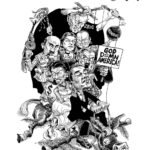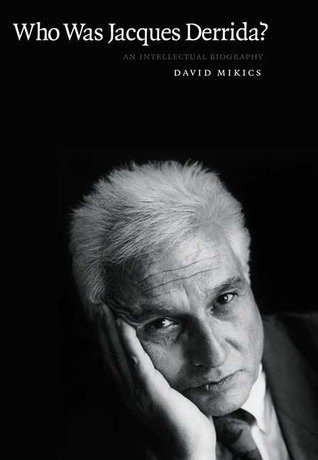Description
Introduction
“Who Was Jacques Derrida? An Intellectual Biography” offers an in-depth exploration of one of the most influential and controversial philosophers of the 20th century. Jacques Derrida, the father of deconstruction, revolutionized the way we think about language, meaning, and interpretation. This article delves into the content of the book, providing a comprehensive overview of Derrida’s life, work, and the lasting impact of his ideas on contemporary thought.
Jacques Derrida: The Man Behind Deconstruction
Early Life and Background
Jacques Derrida was born on July 15, 1930, in El Biar, Algeria, to a Sephardic Jewish family. His early life was marked by the challenges of growing up in a French colonial environment, which shaped his later philosophical inquiries into identity, language, and exclusion. Derrida’s educational journey led him to the École Normale Supérieure in Paris, where he studied under prominent thinkers such as Louis Althusser and Michel Foucault.
Academic and Philosophical Influences
Derrida’s intellectual development was heavily influenced by a range of philosophical traditions, including phenomenology, structuralism, and existentialism. However, it was his engagement with the works of Edmund Husserl, Martin Heidegger, and Ferdinand de Saussure that profoundly shaped his approach to language and meaning, ultimately leading to the development of deconstruction.
The Concept of Deconstruction
What Is Deconstruction?
Deconstruction is a critical approach that challenges traditional notions of fixed meaning in texts. It seeks to uncover the inherent contradictions and ambiguities within language, revealing that meaning is not stable or singular but rather fluid and dependent on context. Derrida argued that language is always in a state of flux, with meanings constantly shifting based on interpretation.
Derrida’s Approach to Language and Meaning
Derrida’s deconstruction questions the binary oppositions that have historically structured Western thought, such as speech/writing, presence/absence, and truth/falsity. He emphasized the importance of différance—a term he coined to signify the endless deferral of meaning in language. Through deconstruction, Derrida sought to show that meaning is always deferred and never fully present, challenging the idea that texts have a singular, authoritative interpretation.
The Structure of the Book
Organization and Style
“Who Was Jacques Derrida? An Intellectual Biography” is organized chronologically, tracing Derrida’s intellectual journey from his early life in Algeria to his later years as a global philosophical figure. The book is written in an accessible style, making it suitable for both scholars and general readers interested in Derrida’s ideas.
Key Sections and Themes
The book is divided into sections that explore key moments in Derrida’s life and work. Major themes include his development of deconstruction, his engagements with other philosophers, and his impact on various academic disciplines. The author also examines Derrida’s personal life, offering insights into how his experiences influenced his philosophical inquiries.
Derrida’s Major Works
“Of Grammatology”
“Of Grammatology,” published in 1967, is perhaps Derrida’s most famous work. In this book, he introduces the concept of deconstruction and critiques the Western philosophical tradition’s emphasis on speech over writing. Derrida argues that writing is not secondary to speech but is, in fact, fundamental to the structure of language.
“Writing and Difference”
In “Writing and Difference,” also published in 1967, Derrida explores the relationship between writing and meaning, emphasizing the instability of language. The book is a collection of essays that address various aspects of deconstruction, including its implications for literature, philosophy, and psychoanalysis.
“Speech and Phenomena”
“Speech and Phenomena,” another seminal work from 1967, focuses on Derrida’s critique of Husserl’s phenomenology. Derrida challenges Husserl’s notion of presence, arguing that meaning is always mediated by language and that there is no pure, unmediated presence in communication.
Impact of Derrida’s Ideas on Philosophy
Influence on Post-Structuralism
Derrida’s ideas played a crucial role in the development of post-structuralism, a movement that emerged as a reaction against structuralism’s rigid approach to language and culture. Post-structuralism, influenced by deconstruction, emphasizes the instability of meaning and the fluidity of cultural and social structures.
Reception in Academia
Derrida’s work has had a profound impact on various academic disciplines, including philosophy, literature, linguistics, and cultural studies. While his ideas have been embraced by many, they have also been met with resistance and criticism, particularly from those who view deconstruction as overly skeptical or nihilistic.
Criticism and Controversy
Challenges to Deconstruction
Deconstruction has been criticized for its perceived relativism and its tendency to undermine the possibility of objective truth. Critics argue that by deconstructing meaning, Derrida leaves us in a state of perpetual uncertainty, where nothing can be definitively known or understood.
Debates in the Intellectual Community
Derrida’s work has sparked intense debates within the intellectual community. Some scholars argue that deconstruction is a valuable tool for uncovering hidden assumptions and power dynamics within texts, while others contend that it leads to a form of intellectual paralysis, where meaning is endlessly deferred and never fully grasped.
Derrida’s Legacy in Contemporary Thought
Continued Relevance in Modern Philosophy
Despite the controversies, Derrida’s ideas remain highly influential in contemporary philosophy. His critique of traditional metaphysics and his emphasis on the fluidity of meaning continue to resonate with scholars and thinkers who challenge established norms and seek to explore new ways of understanding language and reality.
Influence on Literature and Critical Theory
Derrida’s impact extends beyond philosophy into the realms of literature and critical theory. His ideas have influenced a wide range of disciplines, from literary criticism to political theory, shaping the way we think about language, culture, and power.
Understanding the Historical Context
Intellectual Climate of the 20th Century
Derrida emerged as a philosopher during a period of intense intellectual activity in the 20th century. The post-war era saw the rise of existentialism, structuralism, and post-structuralism, with Derrida’s deconstruction becoming a key component of this intellectual landscape.
Derrida’s Place in the History of Philosophy
Derrida is often regarded as one of the most important philosophers of the 20th century, alongside figures like Foucault, Althusser, and Lacan. His work represents a significant shift in philosophical thought, challenging the foundational assumptions of Western metaphysics and opening new avenues for inquiry.
The Book’s Contribution to Derrida Studies
How It Adds to Existing Scholarship
“Who Was Jacques Derrida? An Intellectual Biography” makes a valuable contribution to Derrida studies by providing a comprehensive and accessible overview of his life and work. The book synthesizes existing scholarship while offering new insights into Derrida’s thought and its implications for contemporary philosophy.
Unique Insights and Perspectives
The book offers unique insights into Jacques Derrida’s intellectual journey, shedding light on aspects of his life and work that are often overlooked. It provides a nuanced view of Derrida’s development as a thinker, exploring his personal experiences and their influence on his philosophical inquiries. By examining Derrida’s interactions with other intellectuals and his responses to criticism, the book enriches our understanding of his legacy.
Why Study Derrida Today?
The Importance of Deconstruction in Contemporary Discourse
Deconstruction remains a crucial framework for analyzing texts and cultural phenomena. Its emphasis on the instability of meaning and the critique of binary oppositions have profound implications for various fields, including literature, political theory, and cultural studies. Studying Derrida today allows us to engage with these critical perspectives and apply them to contemporary issues, challenging dominant narratives and exploring new ways of understanding.
Lessons for Modern Thinkers
Derrida’s work encourages modern thinkers to question established norms and explore the complexities of meaning. His approach to language and interpretation highlights the importance of recognizing the inherent ambiguity and multiplicity in our communication. By engaging with Derrida’s ideas, contemporary scholars and practitioners can develop a more nuanced and critical perspective on their own fields of study.
Key Takeaways from the Book
Insights into Derrida’s Thought Process
“Who Was Jacques Derrida? An Intellectual Biography” provides valuable insights into Derrida’s thought process, revealing the evolution of his ideas and their impact on his philosophical work. The book illustrates how Derrida’s early experiences and academic influences shaped his approach to deconstruction and his critique of traditional metaphysics.
The Evolution of Deconstruction
The book highlights the development of deconstruction as a critical tool for analyzing language and meaning. It traces the evolution of Derrida’s ideas and their influence on various academic disciplines, showing how deconstruction has evolved from a controversial theory to a widely recognized framework in contemporary thought.
The Intellectual Biography Genre
What Makes a Good Intellectual Biography?
A good intellectual biography provides a comprehensive and nuanced account of a thinker’s life and work, exploring both their personal experiences and their contributions to their field. It should offer insights into the development of their ideas, the context in which they operated, and their impact on their discipline and beyond.
How This Book Stands Out
“Who Was Jacques Derrida? An Intellectual Biography” stands out for its accessible yet thorough exploration of Derrida’s life and work. The book balances detailed analysis with readability, making it a valuable resource for both scholars and general readers interested in understanding Derrida’s philosophical contributions.
Conclusion
“Who Was Jacques Derrida? An Intellectual Biography” offers a compelling and comprehensive exploration of Jacques Derrida, one of the most influential philosophers of the 20th century. By examining Derrida’s life, work, and the development of deconstruction, the book provides valuable insights into his intellectual legacy and its ongoing relevance in contemporary thought. Whether you are a scholar, a student, or simply interested in philosophy, this book offers a rich and engaging perspective on Derrida’s contributions to the world of ideas.
FAQs
Who was Jacques Derrida?
Jacques Derrida was a French philosopher best known for developing the theory of deconstruction, which challenges traditional notions of meaning and interpretation in language and texts.
What is deconstruction?
Deconstruction is a critical approach that examines the instability of meaning in language, revealing how meanings are constantly deferred and never fully present. It critiques binary oppositions and seeks to uncover hidden assumptions within texts.
How did Derrida’s ideas influence modern philosophy?
Derrida’s ideas, particularly deconstruction, influenced modern philosophy by challenging traditional metaphysical concepts and introducing new ways of understanding language, meaning, and interpretation. His work contributed to the development of post-structuralism and had a significant impact on various academic disciplines.
What are some criticisms of Derrida’s work?
Criticisms of Derrida’s work include accusations of relativism and the idea that deconstruction undermines the possibility of objective truth. Some critics argue that Derrida’s approach leads to intellectual paralysis and that it is overly skeptical of stable meaning.
Why is Derrida still relevant today?
Derrida remains relevant today because his ideas continue to offer valuable insights into the nature of language, meaning, and interpretation. Deconstruction remains a critical tool for analyzing texts and cultural phenomena, and Derrida’s work continues to influence contemporary philosophy and critical theory.




Reviews
There are no reviews yet.